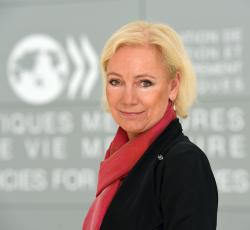Three years after the global community committed to the ambitious Sustainable Development Goals (SDGs) put forth by the 2030 Agenda, the 30 countries that are members of the OECD Development Assistance Committee (DAC) are still struggling to translate this framework domestically. Applicable to rich and poor nations alike, the SDGs provide a framework for collective action that highlights the interdependence of development priorities, countries, and people. Achieving the ambitious goals by 2030 will entail harmonization across many sectors—from education, to urban development, to water supply, to climate mitigation, to maternal and child health, to name just a few priority areas.
There is no one size fits all solution, but efforts clearly must be comprehensive. To accelerate progress and reduce the risk of countries falling off-track, the OECD-DAC and the Global Economy and Development program at the Brookings Institution recently co-hosted a roundtable for DAC members to share experiences in implementing the SDGs by leading whole-of-government efforts while mobilizing other stakeholders.
National governments may want to consider a two-dimensional approach when taking on the SDGs. First, they should adopt a whole-of-government approach—setting national priorities based on their own circumstances while investing internationally to drive global progress. Second, they should consider a whole of society approach—providing leadership so as to mobilize and harness the contributions of a diverse set of stakeholders.
Our roundtable surfaced key issues ripe for further exploration: What is the best way for governments to organize and bring together domestic and global development priorities? How can governments lead SDG implementation while at the same time leaving room for others to lead, maximizing the contributions of all involved? To what extent can policy coherence accelerate progress, and where do countries begin?
A few key insights:
National government ownership must go beyond global development agencies and architecture. High-level political buy-in is critical, as it helps national governments reorient their policy frameworks, plans, and budgets to achieve the SDGs. The success of the SDGs depends on the ability of governments to foster institutional collaboration and create ownership across institutions, both domestic and global. Getting there requires leadership from the top.
High-level attention and support from finance ministers and their treasuries can be powerfully catalytic. Resource strategies must go beyond aid budgets alone to packages that unleash financing for development, both from other ministries as well as private investors and businesses.
This mixed approach of using development finance to mobilize additional finance towards sustainable development or blended finance is already being used in 17 DAC member countries. The OECD report Making Blended Finance Work for the SDGs highlights that blended finance has the potential to unleash greater levels of financing for development, and that donor governments must ensure that the resources mobilized target a broad range of development issues to meet the needs of the SDGs.
Auditors are also well-positioned to provide critical leadership and support to governments in their efforts towards achievement of the SDGs. Incorporating the SDGs in performance objectives and proposed outcomes of government efforts promotes a coherent approach that ripples out into an agenda that is shared throughout different levels of the bureaucracy government-wide. Collecting globally valid information on the progress of governments in an easily accessible way will serve as a strong guiding force in moving the 2030 Agenda for Sustainable Development forward.
Governments must pursue a coherent policy and regulatory environment to mainstream the SDGs across sectors, ensuring that their policies are on track both domestically and internationally. While DAC members are mobilizing to implement SDGs domestically, they must continue to work in concert with international partners to promote progress around the world. The goals, often interconnected, may require making tough decisions on trade-offs and tackling obstacles of ownership and implementation. Investment in policy coherence must be prioritized and also encompass a conflict resolution mechanism, as government objectives will inevitably come into conflict with each other.
Myriad multilateral and regional institutions and platforms are adapting to this agenda. The DAC, through its reform agenda, has committed to better serving its members and the broader international community, building on its strengths and placing achievement of the SDGs at the core of its reforms. Countries must take leadership as shareholders of the international system, supporting and shaping it to deliver effective implementation. Together, countries should construct a system that supports and accounts for their efforts and impact.
Alignment with provincial and city governments will also be crucial. A key facet of the SDG agenda depends upon its localization, focused on making progress in a specific place or location. National governments can provide direction as well as support in facilitating the leadership of local governments in pursuing their own progress on the SDGs.
National leadership must reach into all parts of society, encouraging and harnessing all contributions for maximum impact. Very much linked to political buy-in is ensuring that citizens, civil society, and the private sector are empowered to engage, drive progress, and challenge governments on SDG implementation. Tackling the complexity and ambition of the 2030 Agenda requires integrated approaches that engage external stakeholders throughout the change process in a systematic and regular fashion. Luxembourg, for example, is hosting regular public hearings and workshops with external stakeholders, including youth, raising awareness and influencing government policy concerning SDG implementation. Governments must also provide the space and support for civil society to strengthen accountability, and may be called on to undertake policy reforms focused on changing behavior in the private sector.
Indeed, national governments, to be successful, are being asked to play multiple roles simultaneously. Their leadership will depend upon their ability to strengthen their own internal integration and policy coherence among different levels of government. At the same time, they must be champions in chief, acting as a strategic and encouraging partner to businesses, investors, philanthropies, universities, faith-based organizations, citizens’ groups, youth, and other parts of civil society.
No one is expecting the national governments to do everything, but they are best placed to take the lead and re-orient resources, coordinate capabilities, and maximize all efforts.
Governments should adapt servant leader mindsets—guiding but not dominating, embracing new ideas, and challenging and complementing existing structures. By taking such a stance, they can mobilize and harness the efforts of all segments of society to fulfill the 2030 Agenda at home and abroad.
The Brookings Institution is committed to quality, independence, and impact.
We are supported by a diverse array of funders. In line with our values and policies, each Brookings publication represents the sole views of its author(s).








Commentary
A new type of leadership from national governments is essential for success of the SDGs
April 24, 2018